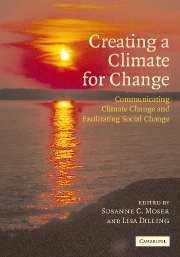Book contents
- Frontmatter
- Contents
- Preface
- Foreword
- List of contributors
- List of tables
- List of figures
- List of text boxes
- Introduction
- Part I Communicating climate change
- 1 Weather or climate change?
- 2 Communicating the risks of global warming: American risk perceptions, affective images, and interpretive communities
- 3 More bad news: the risk of neglecting emotional responses to climate change information
- 4 Public scares: changing the issue culture
- 5 The challenge of trying to make a difference using media messages
- 6 Listening to the audience: San Diego hones its communication strategy by soliciting residents' views
- 7 The climate-justice link: communicating risk with low-income and minority audiences
- 8 Postcards from the (not so) frozen North: talking about climate change in Alaska
- 9 Climate change: a moral issue
- 10 Einstein, Roosevelt, and the atom bomb: lessons learned for scientists communicating climate change
- 11 Across the great divide: supporting scientists as effective messengers in the public sphere
- 12 Dealing with climate change contrarians
- 13 A role for dialogue in communication about climate change
- 14 Information is not enough
- Part II Facilitating social change
- Part III Creating a climate for change
- About the authors
- Index
- References
14 - Information is not enough
Published online by Cambridge University Press: 20 August 2009
- Frontmatter
- Contents
- Preface
- Foreword
- List of contributors
- List of tables
- List of figures
- List of text boxes
- Introduction
- Part I Communicating climate change
- 1 Weather or climate change?
- 2 Communicating the risks of global warming: American risk perceptions, affective images, and interpretive communities
- 3 More bad news: the risk of neglecting emotional responses to climate change information
- 4 Public scares: changing the issue culture
- 5 The challenge of trying to make a difference using media messages
- 6 Listening to the audience: San Diego hones its communication strategy by soliciting residents' views
- 7 The climate-justice link: communicating risk with low-income and minority audiences
- 8 Postcards from the (not so) frozen North: talking about climate change in Alaska
- 9 Climate change: a moral issue
- 10 Einstein, Roosevelt, and the atom bomb: lessons learned for scientists communicating climate change
- 11 Across the great divide: supporting scientists as effective messengers in the public sphere
- 12 Dealing with climate change contrarians
- 13 A role for dialogue in communication about climate change
- 14 Information is not enough
- Part II Facilitating social change
- Part III Creating a climate for change
- About the authors
- Index
- References
Summary
Introduction
Communication about climate change is as complex as the science. Among the most difficult communication challenges is persuading people to act on a problem such as climate change, which is not immediately relevant or easily solved. The challenge becomes even more difficult when you ask people to change routine behavior, such as how they get to work or set their home thermostat.
Not surprisingly, after years of schooling, many readers of this volume probably come to it believing that information changes attitudes and behaviors. Some may go so far as to think information is a cure. Filling eyes and ears with sufficient data may seem a means of cleansing the brain of misguided opinions and incorrect facts, and replacing them with “appropriate” beliefs. Many informational efforts to promote environmentally responsible behavior lean on an implicit theory of behavior (Costanzo et al., 1986) that “right” behavior naturally follows from “right” thinking.
However, more knowledge does not necessarily lead to more appropriate behavior, or even behavior deemed more appropriate by the educator or communicator (Johnson, 1993; Fischhoff, 1995). Social science theory and much empirical research show that links between information and behavior can be tenuous at best. Information is not entirely inconsequential, but it is much overrated as a change agent (see a discussion of the so-called “deficit model” in Sturgis and Allum, 2004; see also Tribbia, Chapter 15, this volume).
Advocates for precautionary action may find it difficult to accept the fragile link between information and behavior.
Information
- Type
- Chapter
- Information
- Creating a Climate for ChangeCommunicating Climate Change and Facilitating Social Change, pp. 223 - 234Publisher: Cambridge University PressPrint publication year: 2007
References
Accessibility standard: Unknown
Why this information is here
This section outlines the accessibility features of this content - including support for screen readers, full keyboard navigation and high-contrast display options. This may not be relevant for you.Accessibility Information
- 20
- Cited by
